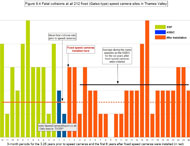6/10/2014
UK: Revised Analysis Finds Accidents Increase With Speed CamerasEngineer Dave Finney examines Thames Valley, UK speed camera data and finds an increase in injuries after the devices were installed.

As "road safety week" kicks off in England, public officials have been touting the benefits of automated ticketing machines. The positive results claimed by government entities do not hold up to scrutiny, claims a report released Monday by Dave Finney, an electronics engineer.
Finney crunched the numbers using the full range of data from the Thames Valley Safer Roads Partnership on accidents at 212 fixed photo radar sites throughout the Thames Valley, which is a follow-up to an analysis of mobile speed camera sites published in 2012. In that year, the area's cameras issued 16,323 tickets worth £1,632,300 (US $2,743,300).
The analysis uses a technique called "four time periods" that is meant to account for the statistical phenomenon known as regression to the mean. Speed cameras are often installed in locations that have experienced an unusually high number of collisions. Even without taking any corrective steps, accidents will likely fall back to the average or mean number of collisions. Finney attempts to account for this by determining the "average" number of collisions prior to camera installation by dividing the data into the time before the site was selected for camera use, the period when the collision rate drew the attention of the site selection committee, the time just before the cameras are activated, and the time when the cameras are actively ticketing. Three years of before and three years of after data are then crunched to reveal the results after excluding the effects of regression to the mean.
The report concludes that fatalities rose 38 percent after cameras were installed and serious injuries rose 16 percent. The overall number of accidents remained the same. Thames Valley claims the devices have saved lives and reduced collisions by 38 percent.
Finney argues the claimed reduction can be attributed to the regression to the mean statistical error. The UK Statistics Authority bolstered this position last year by labeling speed camera partnership claims of lives saved "inappropriate" because they failed to account for regression to the mean (view audit).
Finney recommends that the best way to account for the statistical effects is to commission a truly independent group to hold randomized controlled trials to measure the effect both of installing as well as removing speed cameras.
View chart of killed and serious injury accidents
View chart of overall accidents


